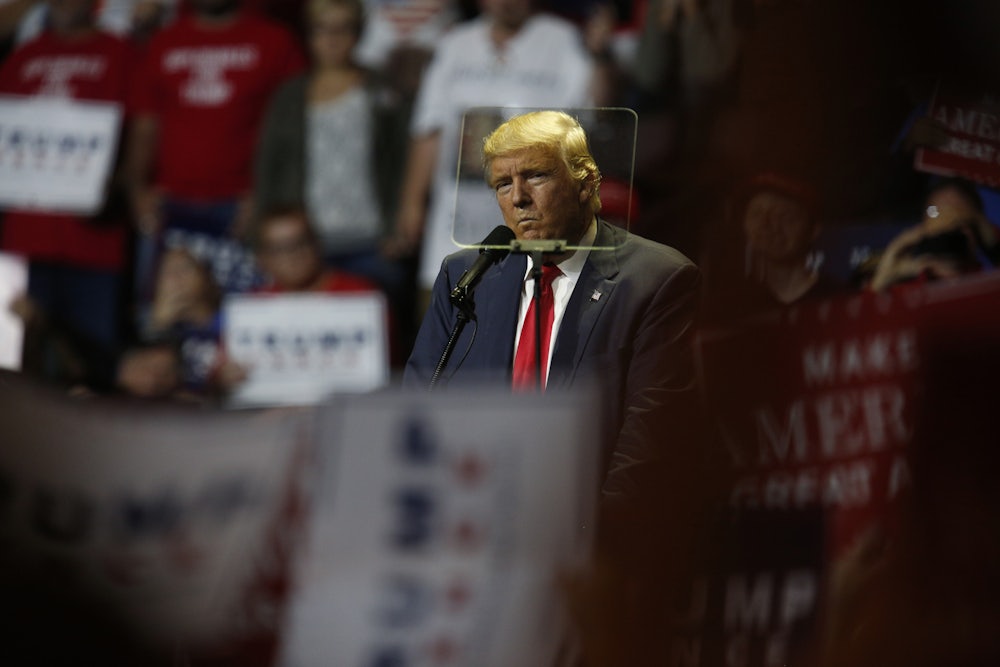At the end of most elections, the political press corps tends to focus on what campaigns call their candidates’ “closing arguments.” The use of courtroom jargon is fitting, because the point of the “closing argument” is to offer the people who decide the election a last-best summation of the case.
For candidates, this usually entails putting on their best faces. Relentless positivity, substantive heft, resume burnishing, and so on.
Donald Trump’s closing argument is that he can use a teleprompter. Not necessarily that the words he reads off the teleprompter are true or intelligent, just that he can say all of them out loud and in order. In the final days of this campaign, we have returned to where we began, with an odd fixation on whether this man who aspires to the presidency can avoid saying anything ignorant, bigoted, inscrutable, or otherwise disqualifying for an hour or so at a time, once or twice a day.
“In what many around him took as a hopeful sign heading into the final stretch of the campaign, the Republican presidential nominee did not turn to Twitter to vent his frustration, as he would have in the past,” reports Yahoo News’ Holly Bailey, a campaign vet. “Though he still regularly breaks from his prepared remarks—often to attack the ‘dishonest media’ to the delight of his supporters—Trump has been more pointed in making his case about why he should win the White House.”
Less than a week before election day, his aides consider it a matter of cardinal importance that Trump recede from the public spotlight as much as possible—he is “trying so hard to keep control,” as CNN’s Dana Bash explained Wednesday night, “because when he becomes the story in the general election it tends to be bad for Donald Trump.”
This is not the standard we were told to expect earlier in the campaign, when Trump and his surrogates promised a “pivot” and a “softening” and reporters searched in vain for evidence of signs of “discipline” as a kind of proxy for whether Trump could learn on the job. The implication was that Trump would have to eclipse some arbitrary but higher level of statesmanship, or his claim to fitness for the presidency would be fatally undermined.
But Trump’s bar was never raised, and was actually lowered for a time. As the campaign winds to a close, reporters are still treating fourth-grade demonstrations of poise as political masterstrokes, when the fact that this is an open question at all is actually horrifying.
The claim that when Trump “becomes the story in the general election, it tends to be bad for Donald Trump,” is 100 percent accurate. But it isn’t some curious phenomenon, or unfair artifact of Trump’s orange skin and tiny hands. The presidency is the most, and most important, public-facing job in the world. The fact that being in the public eye is always politically catastrophic for Trump is a hugely revealing, and damaging fact.
If, when left unattended, a presidential candidate is likely to do something unpredictable but ill-advised, that’s a deadly serious character flaw that needs to be treated as such. If thrust before a global audience without a script, Trump routinely says and does things that make people think less of him, that’s a much bigger deal than whether it means he won or lost a campaign news cycle.
It will be tempting for Trump supporters, or even Trump-skeptical Republicans who are also not fans of Hillary Clinton’s, to suggest an equivalence. When the spotlight’s on her, it’s usually bad for her public standing, too. Emails, emails, emails, etc.
Set aside for a moment the fact that the email controversy is largely bullshit; this is a much different phenomenon than the one that bedevils Trump. That most media coverage of Clinton is unflattering (the press’ email obsession, after all, has accounted for more evening newscast airtime than all airtime devoted to policy matters combined) has no bearing on how the voting public views Clinton when she has the stage to herself.
To the contrary, there’s a seemingly inverse relationship between how people view Clinton when the press is painting a portrait of her, and how they view her when she’s actually doing her job.
Her favorability ratings were famously high when she was secretary of state, but even when she returned to the political arena, her best moments have been when she’s taken control of the cameras and the scripts away from news producers. Her eleven hours of Benghazi Committee testimony served as a potent reminder of her competence. She enjoyed a huge bounce in the polls after the Democratic National Convention, and a similarly large one after the three presidential debates, all of which she won overwhelmingly.
With the exception of the first debate, though, the same people now remarking upon Trump’s relative calm were unable to see what the viewing public clearly saw. In September and October, thanks to the “grab them by the pussy” tape and a steady trickle of sexual assault allegations, the bar for Trump was set even lower than it is now. Many debate-performance critics thus wondered if Trump had fought to a draw during the second and third debates simply because he didn’t turn into a pile of sawdust, or use the c-word. His convention bounce was negative, and he tends to respond to his opponent’s successes by imploding further. After the DNC, he spent a week attacking a gold-star family. After the first debate, he spent a week fat- and slut-shaming a former Miss Universe.
Everything we’ve seen over the past several months points to the fact that Clinton is at her strongest when she’s disintermediated, while Trump unvarnished is a walking murder-suicide. By leaving this contrast unstated, and saying nothing at all about its implications for the presidency, the media is failing those Americans who have a choice to make by November 8.
